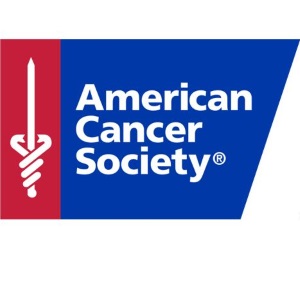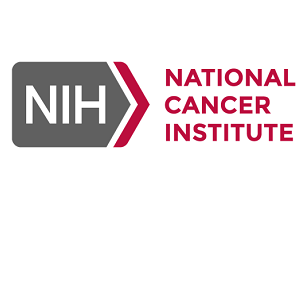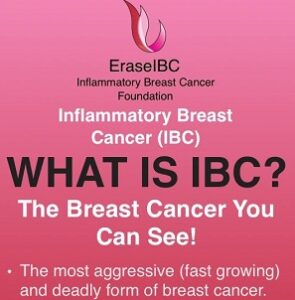Inflammatory Breast Cancer (IBC)
- Black women are 72 percent more likely than White women to be diagnosed with inflammatory breast cancer.
- Black women are diagnosed with this cancer at an average of four years younger than White women.
- Black women die an average of one and one-half years earlier than White women with the disease.
One breast appeared slightly larger than the other. “Something is off,” she remembered thinking.
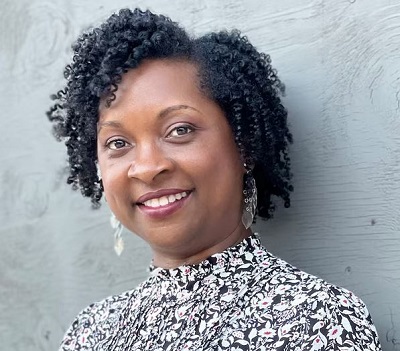
While crawling on the floor with her youngest child, a toddler at the time, Katrece Nolen caught a glimpse down the front of her shirt. One breast appeared slightly larger than the other. “Something is off,” she remembered thinking. So she called her doctor.
But her doctor was away that day, and the receptionist asked if she wanted to make an appointment for a later date. “I said, ‘No, I need to see somebody today,’ ” Nolen recalled. And that’s what she did.
It was 2013. Nolen would be diagnosed with inflammatory breast cancer. She would beat it, though, and her urgent pursuit of a diagnosis and treatment was a big part of the reason.
“The most important thing about self-advocacy is don’t give up,” says Nolen. “You have to push through the despair to get the test results, the diagnosis and the appointments you need.”
See “Advocating for her life in a battle against breast cancer” by Courtland Milloy on the Washington Post website (February 22, 2022)
""If your breasts swell, if the skin changes texture and it becomes to look thick like an orange, go to a doctor. "
“I’m Kimberly Bennett and I’m fighting inflammatory breast cancer. I first realized something was wrong when my breast was going from purple to burgundy. And it was hot and it was getting bigger and warmer and it was painful. And so I knew something was wrong, but I thought it was just an infection.”
It wasn’t an infection, the diagnosis was inflammatory breast cancer.
“If your breasts swell, if the skin changes texture and it becomes to look thick like an orange, if they all of a sudden get hot, if your nipple that used to poke out starts to invert, if your discoloration, remember the discoloration.”
“And if they swell, by all means, go to a doctor. The goal of this cancer is to kill you and to kill you fast. And so the only thing that you can do to help yourself is to respond and react as fast as you can. That’s the only thing that will save your life.”
A 4-minute video from the Inflammatory Breast Cancer Foundation.
"This is a a type of breast cancer that does not show up with a lump and rarely shows up in mammograms"
“This is a type of breast cancer that does not show up with a lump, so it is very often misdiagnosed until it has metastasized into a stage 4 cancer. If we know what to look for, we are so much safer,” says Florida counselor and inflammatory breast cancer survivor Martha Van Dam.
“It’s called inflammatory breast cancer because the breast actually becomes inflamed…Another thing you need to know about inflammatory breast cancer is that it very rarely shows up in mammograms.
“The message is this: If you see something different about your breasts, something that changes, that is not normal, do not just assume. If you want to give it a little bit of time, give it a very little bit of time. And if it isn’t better in two days then get it checked out.”
“You really, really hope you can find it at stage 3. If you find it at stage 4, then it’s already spread to a more distant part of the body.”
A 9-minute video from Martha Van Dam
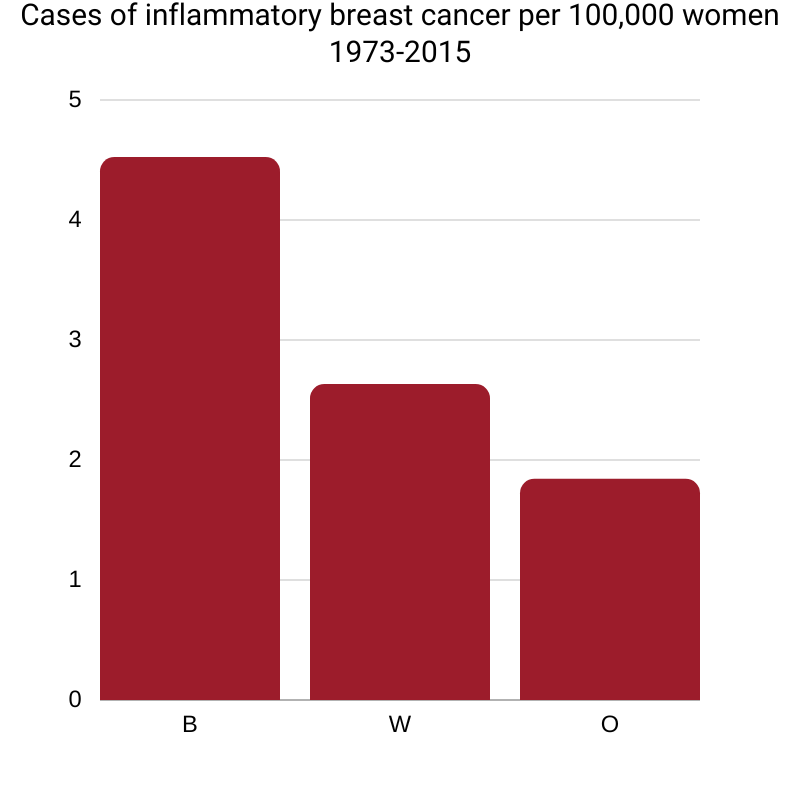
B=Black 4.52, W=White 2.63,
O=Other Asian, Pacific Islander, Native American etc. 1.84
Source: Incidence and survival of inflammatory breast cancer between 1973 and 2015 in the SEER database (2021)

O=Other Asian, Pacific Islander, Native American etc. 45.2%, W=White 43.5%, B=Black 29.9%
Source: Incidence and survival of inflammatory breast cancer between 1973 and 2015 in the SEER database (2021)
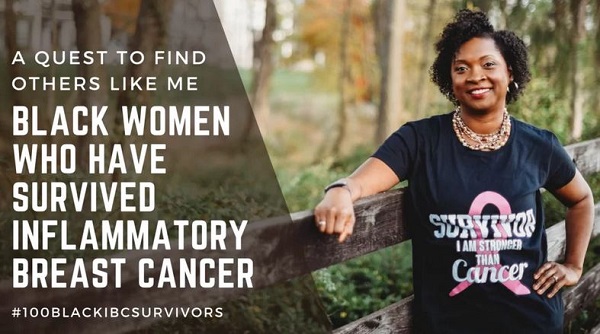
In 2013, at the age of 38, Katrece Nolen was diagnosed with stage 3 inflammatory breast cancer. Next year, she will celebrate 10 years since diagnosis, “a significant milestone for someone diagnosed with this disease and is especially rare for a Black woman,” she says.
“There are very few stories of Black women surviving Inflammatory Breast Cancer because, quite simply, most don’t live to tell their stories. This disease needs more attention and research – but without more Black women surviving, who is alive to tell our story?”
“For this reason, I am on a quest to find 100 Black women survivors of this rare and aggressive form of breast cancer. I hope that by sharing my story and connecting with other Black women who have faced this disease, we can help increase awareness and understanding of this type of cancer.”
Read more at “A Quest to Find 100 Black Women Who Have Survived Inflammatory Breast Cancer” on the IBC Network Foundation website (October 4, 2022)
How Dana-Farber Cancer Institute is working to reduce the disparity in inflammatory breast cancer
Despite Black women making up a disproportionate percentage of all IBC cases, the diagnosis, treatment, and representation of IBC has historically been centered around White women. Dana-Farber Brigham Cancer Center in Boston, which has the only specialized IBC program of its kind in the Northeast United States, is taking a multi-pronged approach to reducing this inequity.
 “We want to make sure that, when it comes to inflammatory breast cancer, Black women diagnosed with IBC have the same chance of success and survival as anyone else,” said Filipa Lynce, MD, director of the Inflammatory Breast Cancer Program in the Susan F. Smith Center for Women’s Cancers at Dana-Farber. “If we don’t work to correct these disparities, then we are failing our patients, and failing in our mission of providing truly equitable medical care.”
“We want to make sure that, when it comes to inflammatory breast cancer, Black women diagnosed with IBC have the same chance of success and survival as anyone else,” said Filipa Lynce, MD, director of the Inflammatory Breast Cancer Program in the Susan F. Smith Center for Women’s Cancers at Dana-Farber. “If we don’t work to correct these disparities, then we are failing our patients, and failing in our mission of providing truly equitable medical care.”
Unlike most cancers, IBC is diagnosed primarily from clinical observation; a diagnosis may not be evident from typical breast cancer screening, like mammograms.
“We really rely on the experience of clinicians to make a diagnosis,” Dr. Lynce says. “It’s a rare disease and easily missed, especially for people not practicing at centers that treat a large number of patients diagnosed with IBC.”
One of the criteria of IBC is redness of the skin, which is going to look different on someone who has skin tones other than white. A problem that plays into this is that even with higher incidence rates of IBC in Black women, and the importance of a clinical diagnosis of IBC, illustrations of women with IBC tend to depict White women.
Dana-Farber is taking action to make sure that every kind of person is represented in depictions of IBC. Patients in Dana-Farber’s IBC program are given an educational binder that features illustrations of a wide range of patients — depicting those who are Southeast Asian, Native American, Black, and White. These images are also available to Dana-Farber faculty members.
“We are working on making sure that the materials used to explain IBC to patients and healthcare providers are representative of different races and ethnicities — not only at Dana-Farber but also outside of Dana-Farber,” says Dr. Lynce. “That will lead to a better and more timely diagnosis.”
Another important component is the lack of representation of Black patients in clinical trials. Like many large academic medical centers, the majority of Dana-Farber patients have historically been White, and clinical trials also tend to be of mostly White patients.
 “If we aren’t enrolling patients who are representative of the population with a certain cancer when it comes to race, ethnicity, other medical conditions, gender, and age, then we aren’t learning the whole picture about how to optimally treat all patients,” said Rachel A. Freedman, MD, MPH, medical director of the Dana-Farber Cancer Care Collaborative. “It means we have to extrapolate research and results in other populations to those not represented on studies. It is imperative that trial populations represent patient populations whenever possible.”
“If we aren’t enrolling patients who are representative of the population with a certain cancer when it comes to race, ethnicity, other medical conditions, gender, and age, then we aren’t learning the whole picture about how to optimally treat all patients,” said Rachel A. Freedman, MD, MPH, medical director of the Dana-Farber Cancer Care Collaborative. “It means we have to extrapolate research and results in other populations to those not represented on studies. It is imperative that trial populations represent patient populations whenever possible.”
Dr. Lynce hopes that these actions and others help ensure that Black patients are not left out of the IBC conversation.
“We need to know the entire picture of IBC in order to treat and cure it, and that includes helping all patients with this aggressive cancer,” says Dr. Lynce. “These steps are part of the larger picture of righting medical disparities, but one where I know we are already making a difference.”
See “Addressing Disparities in the Diagnosis and Care of a Rare Breast Cancer” by Jen A. Miller on the Dana-Farber Cancer Institute website (2022)
"""Being in a clinical trial also makes me feel good"
“I was diagnosed with a rare and aggressive cancer, inflammatory breast cancer, and was approved for a clinical trial at the MD Anderson Cancer Center,” says Michelle Willliams. “The clinical trial is two years and I’ve already made the one year mark so far. So I’m very excited about that. The treatments are very simple, they’re only 30 minutes every three weeks, and I have hardly any side effects.”
“Being in a clinical trial also makes me feel good because it gives the hospital a chance to continue their research. I would suggest anyone who has the opportunity to do a clinical trial so that our survival rates are higher and we can enjoy life.”
A 1-minute video from MD Anderson Cancer Center
About Inflammatory Breast Cancer
Signs and symptoms of inflammatory breast cancer, how it is diagnosed, stages of the cancer, survival rates, and treatment. From the American Cancer Society.
IBC is rare and has some unusual warning signs that many women don’t realize can signal the disease. This leads to 1 in 3 cases being diagnosed after the cancer has already spread to distant parts of the body.
IBC occurs more frequently in women younger than 40, Black women and women who are obese or overweight. It is important to see a doctor as soon as you notice any alarming symptoms. From BlackDoctor.org.
What is inflammatory breast cancer?, the symptoms, how it’s diagnosed, how it’s treated, what is the prognosis, what clinical trials are available. From the National Cancer Institute, part of the National Institutes of Health (NIH).

Credit: American Cancer Society
IBC causes a number of signs and symptoms, most of which develop quickly (within 3-6 months), including:
- Swelling (edema) of the skin of the breast
- Redness involving more than one-third of the breast
- Pitting or thickening of the skin of the breast so that it may look and feel like an orange peel
- A retracted or inverted nipple
- One breast looking larger than the other because of swelling
- One breast feeling warmer and heavier than the other
- A breast that may be tender, painful or itchy
- Swelling of the lymph nodes under the arms or near the collarbone
If you have any of these symptoms, it does not mean that you have IBC, but you should see a doctor right away.
Source: Inflammatory Breast Cancer (American Cancer Society, 2022)
"Really important to be aware of the signs and symptoms of IBC"
“Unfortunately, we hear about patients who were initially misdiagnosed with a breast infection that just did not heal,” says Ko Un Park, MD, a breast cancer surgeon at The Ohio State University.
“If patients are experiencing that a breast infection is not improving, they should definitely seek additional care to see if this is something else like an inflammatory breast cancer.”
A 2-minute video from The James Ohio State University Comprehensive Cancer Center
A Public Service Announcement from the IBC Network Foundation
What is inflammatory breast cancer?, the symptoms, how it’s diagnosed, how it’s treated, what is the prognosis, what clinical trials are available. From the National Cancer Institute, part of the National Institutes of Health (NIH).
A 1-minute video from the IBC Network Foundation.
"Feeling a lump is usually not an IBC symptom, it affects the whole breast"
Filipa Lynce, MD, director of the Inflammatory Breast Cancer (IBC) Program at Dana-Farber Cancer Institute, discusses the common symptoms of IBC, risk factors, and the importance of talking to a doctor if you notice any changes in your breast.
A 3-minute video from the Dana-Farber Cancer Institute
Inflammatory Breast Cancer Support Groups
The purpose of The IBC Network Foundation is simple:
- To fund research regarding Inflammatory Breast Cancer.
- To provide an avenue to network proactive education to the general population as well as the medical community regarding Inflammatory Breast Cancer.
“The Inflammatory Breast Cancer Foundation‘s mission is to change the perceived notion that all breast cancers begin with a lump. IBC is different is so many ways. Women & men are still being misdiagnosed and that is not acceptable!”

